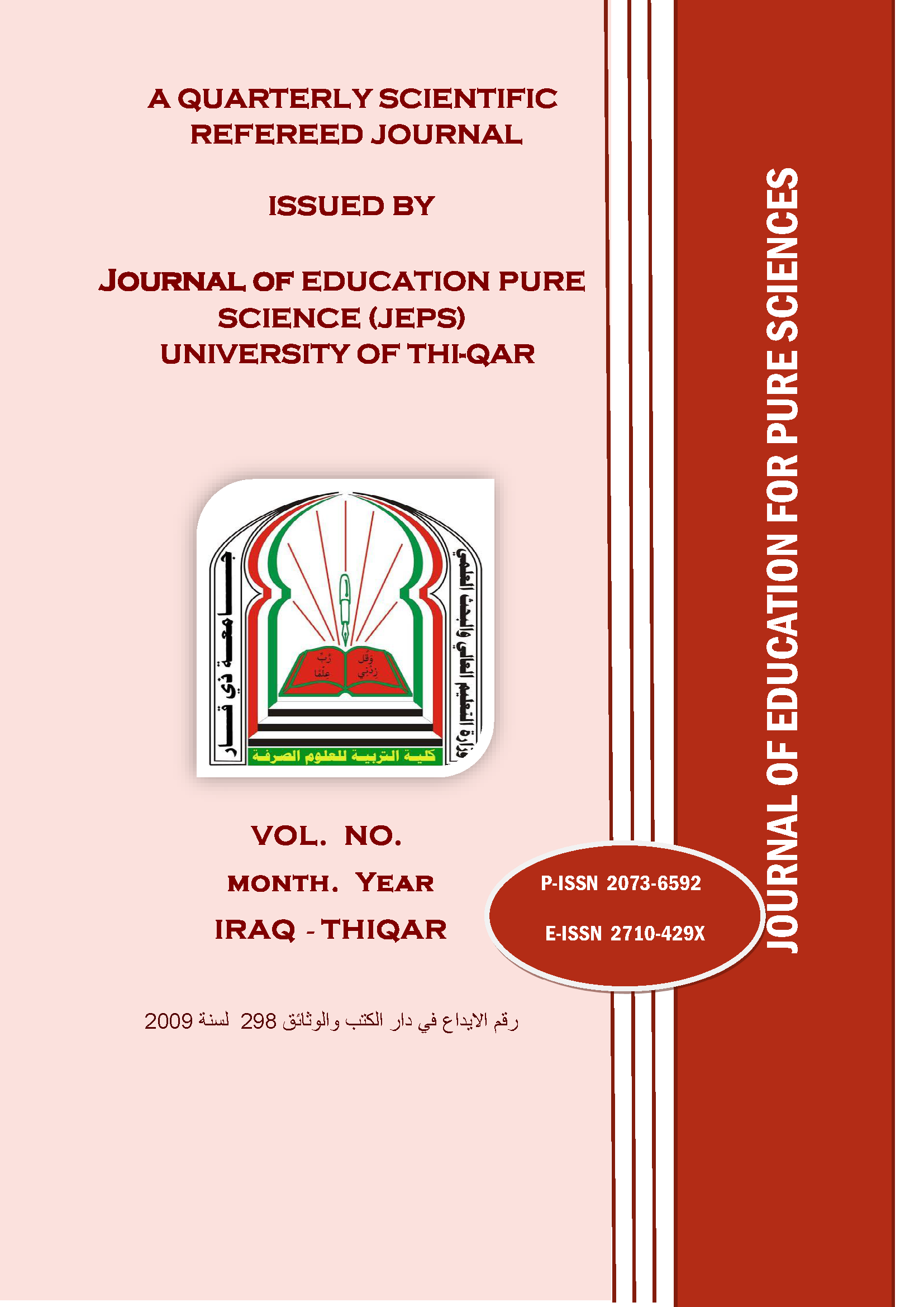Evaluation of amyloid protein expression in a neurodegenerative rat model impairs memory abilities by Ocimum basilicum extract
DOI:
https://doi.org/10.32792/jeps.v13i4.376Keywords:
Amyloid protein, immunohistochemistry, Ocimum basilicum, memory abilitiesAbstract
Abstract
The main objective of this study was to evaluate of the neuroprotective potential effect of Ocimum
basilicum on amyloid protein expression in rat induced Alzheimer's disease. Fifty rats were divided into
five groups (ten rats each). Rats were treated orally with AlCl3 to induced AD. Group I (control group). Group II (AD group): supplemented orally with AlCl3 (17mg/kg/day) for four weeks. Group III (O .b
/AD group) supplemented concomitantly with oral rivastigmine (3 mg/kg /day). Group IV (O .b/AD group) supplemented concomitantly with oral OB (250mg/kg/day) and Group V (O. b/AD group)
supplemented concomitantly with oral O. b (500 mg/kg/day). The results showed that deposition of
amyloid protein expression was increased in positive group (AD induced rats) . Histological changes were observed in brain tissues of AD rats. Minor deposition of amyloid protein (arrow) in cerebral parenchyma was observed. However, the high dosing of the plant leaves extract (500 mg/kg) was more powerful than the low treatment with low dose (250 mg/kg) by decreasing accumulation of amyloid
protein expression. The results suggest that Ocimum basilicum can relieve symptoms and prevent the
progression of AD severity by improving memory function. It can be concluded that OB leaves were alleviated the memory impairment and learning abilities due to antioxidants activity of flavonoids, tannins and terpenoids
References
- M.A. DeTure, D.W. Dickson, The neuropathological diagnosis of Alzheimer’s disease, Mol. Neurodegener. 14 (2019) 1–18 2019 14:1, BioMed Central., doi: 10.1186/S13024-019-0333-
.[2]- ]-Yuan, Ning Ning Cai, Cui Zan Wu, Ming Yue Su, Huan Xing Li, Min Lu, Jia Hong Neuroprotective effects of berberine in animal models of Alzheimer's disease: A systematic review of pre-clinical studies (2019). BMC Complementary and Alternative Medicine.
-.Mahdy, K., Shaker, O., Wafay, H., Nassar, Y., Hassan, H., & Hussein, A. (2012). Effect of some medicinal plant extracts on the oxidative stress status in Alzheimer’s disease induced in rats. European Review for Medical and Pharmacological Sciences, 16(SUPPL. 3), 31–42.
- ( Mehan, S. et. al. (2015). Ameliorative Treatment with Ellagic Acid in Scopolamine Induced Alzheimer’s Type Memory and Cognitive Dysfunctions in Rats. Austin Journal of Clinical Neurology, 2(6). www.austinpublishinggroup.com.
-Bui, T. T., & Nguyen, T. H. (2017). Natural product for the treatment of Alzheimer’s disease. Journal of Basic and Clinical Physiology and Pharmacology, 28(5), 413–423. https://doi.org/10.1515/jbcpp- 2016-0147
- Gong S,Miao YL, Jiao GZ, SunMJ, Li H, Lin J, Luo MJ, Tan JH (2015)
Dynamics and correlation of serumcortisol and corticosterone under
different physiological or stressful conditions in mice. PLoS One
(2):e0117503.
- Joris J Hoelbeek, Jesper Kers, Eric J Steenbergen, Joris J T H Roelofs, Sandrine Florquin, Renal amyloidosis: validation of a proposed histological scoring system in an independent cohort, Clinical Kidney Journal, Volume 14, Issue 3, March 2021, Pages 855–862, https://doi.org/10.1093/ckj/sfaa019
- ] Wightman, Emma L. - Potential benefits of phytochemicals against Alzheimer's disease.(2017) Proceedings of the Nutrition Society.
- PORSTEINSSON AP, GROSSBERG GT, MINTZER J, OLIN JT. Memantine MEM- MD-12 Study Group. Memantine treatment in patients with mild to moderate
Alzheimer’s disease already receiving a cholinesterase inhibitor: a randomized, doubleblind, placebo- controlled trial. Curr Alzheimer Res2008; 5: 83-89.
-SHAH S, REICHMAN WE. Treatment of Alzheimer’s disease across the spectrum of severity. Clin Interv Aging 2006; 1: 131-142.
- XIAO XQ, WANG R, HAN YF, TANG XC. Protective effects of huperzine A on beta-amyloid (25–35) induced oxidative injury in rat pheochromocytoma cells. Neurosci Lett 2000; 286: 155-168.
-Kaur, R., Mehan, S. et. al. (2015). Ameliorative Treatment with Ellagic Acid in Scopolamine Induced Alzheimer’s Type Memory and Cognitive Dysfunctions in Rats. Austin Journal of Clinical Neurology, 2(6). www.austinpublishinggroup.com
-N .Malik, s. Amber ,s. zahid. 2022Rosmarinus officinalis and Methylphenidate Exposure Improves Cognition and Depression and Regulates Anxiety-Like Behavior in AlCl3-Induced Mouse Model of Alzheimer’s Disease.
Downloads
Published
Issue
Section
License
Copyright (c) 2023 Journal of Education for Pure Science- University of Thi-Qar

This work is licensed under a Creative Commons Attribution-NonCommercial-NoDerivatives 4.0 International License.
The Authors understand that, the copyright of the articles shall be assigned to Journal of education for Pure Science (JEPS), University of Thi-Qar as publisher of the journal.
Copyright encompasses exclusive rights to reproduce and deliver the article in all form and media, including reprints, photographs, microfilms and any other similar reproductions, as well as translations. The reproduction of any part of this journal, its storage in databases and its transmission by any form or media, such as electronic, electrostatic and mechanical copies, photocopies, recordings, magnetic media, etc. , will be allowed only with a written permission from Journal of education for Pure Science (JEPS), University of Thi-Qar.
Journal of education for Pure Science (JEPS), University of Thi-Qar, the Editors and the Advisory International Editorial Board make every effort to ensure that no wrong or misleading data, opinions or statements be published in the journal. In any way, the contents of the articles and advertisements published in the Journal of education for Pure Science (JEPS), University of Thi-Qar are sole and exclusive responsibility of their respective authors and advertisers.





